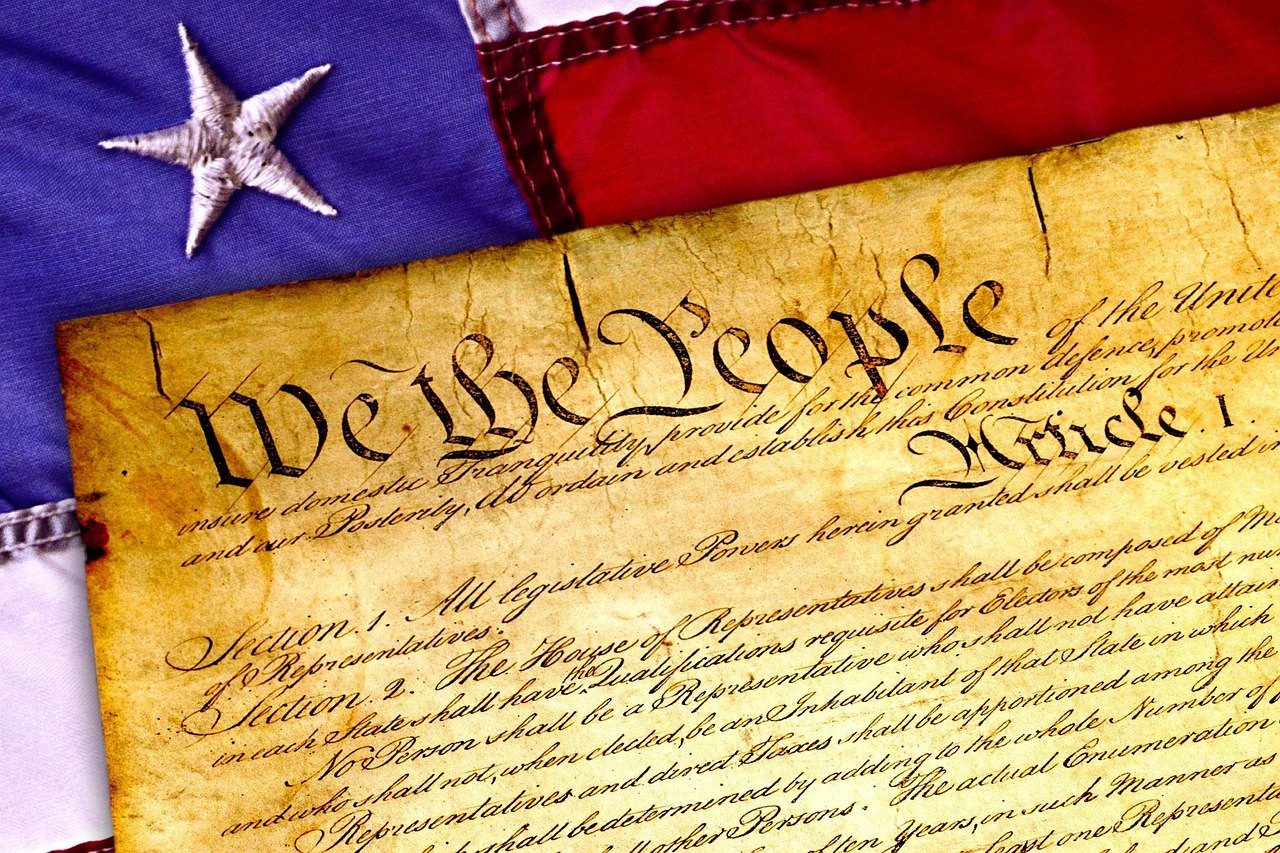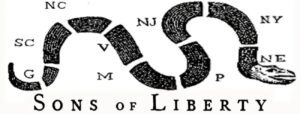
Most have heard of the Sons of Liberty, but the main thing we know is that they were colonial agitators who dumped tea into Boston Harbor. They were much more. Although their original target was British taxes, they quickly realized the need for independence and intensified their efforts. They were a grassroots group of instigators and provocateurs who used civil disobedience, threats, and violence to intimidate loyalists and to tweak the British Crown. They wanted to push moderates into a revolution against the Crown and they succeeded.
The Seven Years War (French and Indian War in America 1754-1763) was a global war that pushed the British Empire to the brink of financial collapse. The British Empire was also global with colonies in many more places than North America. The Crown saw the American colonies, as a source of new tax revenue.
The British saw the French and Indian War as a conflict that benefitted the American colonies. They also had to maintain about 10,000 troops in those colonies to protect them. They were correct but did not consider the price the colonials and Indians had paid in blood, destruction, and lost commerce during the war. They also conveniently did not mention the income they derived from trade they had with the American colonies. The colonists provided tobacco, rice, furs and much more to Britain and it was transported in British merchant ships.
Britains were already bearing extremely high taxes, so Parliament decided to solve their financial plight by new taxes on the colonials and by the 1765 Quartering Act. This act provided British colonial governors with the authority to forcefully quarter soldiers in colonial buildings and homes. The colonials also had to care for the troops and feed them. This was a particularly onerous law that garnered considerable anger. Fortunately, the act expired in 1767.

The first new tax had been the April 1764 Sugar Act which taxed the transport and sale of raw sugar, molasses, and rum. This tax was to be paid only with gold or silver. Smuggling helped circumvent this tax, so it did not raise much money. The British, however, found a way to tax nearly all aspects of colonial life by passing the Stamp Act on 22 March 1765. This was a tax on most documents and paper products and was payable in British Sterling only.
Colonial anger boiled over, and a secret group in Boston, Massachusetts called the “Loyal Nine” was attracting large crowds around the Liberty Tree in Boston. (The Liberty Tree was a stately elm near Boston Common, which was cut down by Loyalists in 1775.) The Loyal Nine demanded the newly appointed Collector of Stamps walk to the Liberty Tree and resign. Wisely fearing for his life, he walked through town in a driving rain and resigned to the cheers of the crowd. The crowd then trashed his home and burned his office.

The Loyal Nine also incited the crowds to riot throughout Boston. The rioters targeted taxable goods and tax collectors. Officials were in danger of being tarred and feathered or killed. They raided the home of Lieutenant Governor Thomas Hutchinson and stole an estimated 250,000 pounds-sterling of his possessions.
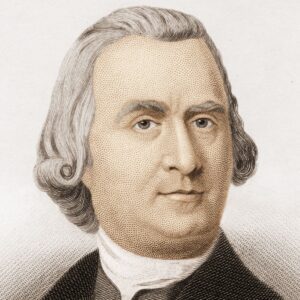
After successfully inciting riots, the Loyal Nine began publishing inflammatory patriotic articles in the Boston Gazette under the byline of “The Sons of Liberty.” The Loyal Nine had become a much larger organization and its membership was no longer secret. Samuel Adams was the founder of the Sons of Liberty and wrote most of the articles for the Gazette. The first Sons of Liberty chapters were organized in Boston and New York City, but chapters were soon organized in all the colonies.
The group may have taken its name from a speech given in Parliament by Isaac Barre, an Irish member sympathetic to the colonists. He warned that the British government’s behavior “has caused the blood of these sons of liberty to recoil within them.”
The violent colonial resistance resulted in repeal of the Stamp Act within a year of its passage. However, in retaliation, Parliament passed the Declaratory Act in 1766. This act declared that the British King and Parliament had the power to enact any and all legislation on the colonies. This act was more of a “threat” than a law, but it enhanced the Sons of Liberty slogan of “No Taxation Without Representation.”
At this point, the Sons of Liberty still considered themselves to be loyal subjects of the Crown, but as British will stiffened, colonial resistance to all British actions increased. The colonial goal was quickly becoming revolution and independence.
No matter how much the colonials resisted, the British were still in debt and needed money. On 29 June 1767, Parliament passed the “Townsend Acts” which increased taxes and tariffs on most British products, such as lead, paint, paper, ink, porcelain, glass, and tea. The act also allowed British troops to enter any colonist’s home to search for smuggled goods.
The colonials began to produce as many products as possible to avoid the Townsend taxes and the Sons of Liberty began smuggling in cheaper goods. In 1768, Sons of Liberty member and tea smuggler, John Hancock, was arrested and put on trial. Attorney John Adams successfully defended Hancock, but smuggling was obviously becoming riskier.
Under the direction of the Sons of Liberty, a total boycott of all British goods was organized. They enforced the boycott in Boston and the surrounding area by threatening merchants and shopkeepers. If a merchant sold British goods his shop was vandalized, and his life was at risk.
By 1769, the British deployed 2,000 additional soldiers to Boston to help control the colonial unrest and violence. This was an unusually large number of troops for a city that had a population of only 16,000.
The British were doing everything wrong in their effort to tamp down colonial resistance, and the increased presence of British troops caused more resentment. The area of most colonial resistance was Boston, but resistance was increasing in all thirteen colonies.
All hopes of even a relative peace were shattered on the evening of 5 March 1770 when the “Boston Massacre” occurred. The “massacre” erupted when a minor incident involving a small group of colonials and a British Army guard at the Customs House escalated into a major confrontation. Additional British soldiers were deployed to aid the guard.
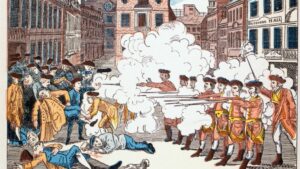
The British soldiers were facing a large, angry and aggressive mob of colonists who were throwing rocks and other debris at the soldiers. They were also taunting the soldiers to “shoot.” The soldiers eventually opened fire on the mob, and five colonists were killed and another six wounded. In all the confusion and anger, no one knew why the shooting started. The soldiers were eventually tried with mixed outcomes. They were defended by attorney John Adams.
The Boston Massacre was a “gift” to the Sons of Liberty because they used it to further enflame passions. Sons of Liberty member Paul Revere made a provocative engraving of the incident that “depicted the brutality and barbarism of the British Army.” This engraving was widely distributed to all the colonies and the resultant rage pushed more colonials toward revolution.
The increasing resistance by the Sons of Liberty and average citizens caused Parliament to ease most of the new taxes. However, they still needed revenue and continued the high tax on tea. This forced colonists to pay very high taxes for British Tea while importers paid no tax. A monopoly was created for the British-government-owned East India Company, which undercut local merchants and foreign tea importers, driving many to bankruptcy.
This is when resistance began to be more serious with increased violent action. In 1773 the British did not believe the colonists would follow through on their stated refusal to pay higher tax on tea and East India ships began arriving in American ports of Boston, New York, Philadelphia and Charleston. This was met with resistance in all the ports and cargos of tea were not allowed to be unloaded except in Charleston where the tea was confiscated and later sold to help pay for the Revolutionary War.
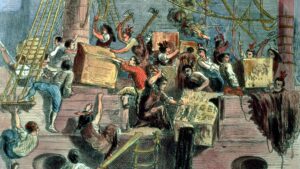
In Boston three ships loaded with tea entered the harbor but the Americans refused to allow the ships to unload. This did not deter the British and the ships docked at Griffin’s Wharf. Instead of purchasing the tea, the Sons of Liberty boarded the ships during the night of 16 December 1773. The boarders were dressed as American Indians and dumped the tea overboard. Known as the “Boston Tea Party,” in three hours, 92,000 pounds of tea was dumped into the harbor, which cost the British Empire over $1,700,000 in today’s dollars
A fourth Boston bound ship ended up at Cape Cod and its cargo had been sold. The tea was stored in a Boston warehouse, so the Sons of Liberty raided the building and destroyed the tea. Some tea had already been sold to a merchant, so the Sons of Liberty broke into his shop and dumped his tea into the harbor.
The British did not take the increased acts of resistance lying down. On 28 March 1774 they passed the Coercive Acts (Intolerable Acts to the colonists) which had four major points. It closed Boston Harbor, suspended trial by jury, prohibited elections and meetings of state assemblies, and forced the quartering of British soldiers in private buildings and homes.
The British correctly expected major resistance to the new laws and took steps to counter it. They also realized that the main hotbed of resistance was New England, and in particular Boston. The British turned to Lieutenant General Thomas Gage.

Gage was a decorated war hero in the French and Indian War. He served as the Commander-in-Chief of all British Forces in North America from 1763 to 1774. In May 1774 he arrived in Boston to replace Thomas Hutchinson as Royal Governor of Massachusetts. Gage’s orders were to enforce the Coercive Acts.
By this time, the colonials in Boston and the surrounding areas were politically well-organized in their resistance to British rule and colonial militia groups were armed and ready. Revolution was in the air, and Governor Gage knew that it would be difficult to subdue the well-organized patriots in New England.
On 19 April 1775, under orders from Britain, Gage sent a detachment of troops to seize patriot munitions in Concord and to apprehend Sons of Liberty leaders Samuel Adams and John Hancock. An informant warned Adams and Hancock, allowing them to escape capture. However, the “shot heard around the world” opened the battle between British soldiers and townspeople in Concord and Lexington. This was the first battle of the American Revolution, and nothing could stop the quest for freedom.
On 12 June 1775, Gage tried a different approach offering amnesty to all Bostonians except Sam Adams and John Hancock. His proclamation read in part: “In this exigency of complicated calamities, I avail myself of the last effort within the bounds of my duty, to spare the effusion; to offer, and I do hereby in his Majesty’s name, offer and promise, his most gracious pardon to all persons who shall forthwith lay down their arms, and return to the duties of peaceable subjects, excepting only…, Samuel Adams and John Hancock, whose offences are of too flagitious a nature to admit of any other consideration than that of condign punishment.”
This proclamation backfired on Gage. It was so patronizing that it infuriated the Bostonians. Many who had not been sympathetic with the cause became overnight patriots, and some actively joined the resistance.
Gage’s forces next engaged American militia in the Battle of Bunker Hill on 17 June 1775. It was technically a British victory but nearly one-third (or 1,500) British troops were left on the field dead, wounded, or captured. Gage was recalled to London in the fall of 1775 where he remained until his death in 1787.
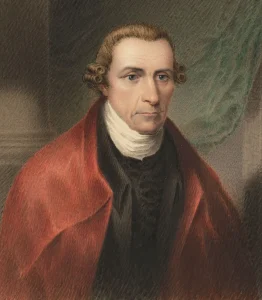
The situation in Massachusetts encouraged Sons of Liberty chapters in other colonies to act and patriotic resistance was becoming too much for the British to handle. Lawmakers in Virginia met in 1775 to discuss negotiations with the British King but Sons of Liberty member, Patrick Henry, gave his famous speech that ended: “Give me liberty or give me death!” He moved Virginia away from reconciliation.
Revolutionary fever was uniting the colonies and war had become inevitable. A continental army was being organized and the Declaration of Independence would be drafted and signed in1776.
Once war began in earnest, most members of the Sons of Liberty joined the military or became political leaders that drafted our founding documents and established a new government. Some, however, stayed home and terrorized Loyalists. There was open and bloody fighting between Patriots and Loyalists in some areas, and most Loyalists who escaped to Canada lost nearly everything.
When war ended some Sons of Liberty chapters temporarily reconstituted to influence politics in their states. In New York they managed to get legislation passed to expel Loyalists and to confiscate their property. This violated the Paris Accords peace treaty and Alexander Hamilton defended the Loyalists in court. No matter the court decisions, confiscating and reselling Loyalist property became an American cottage industry.
The Sons of Liberty defiance of the British, particularly in Boston and New York City, was a major factor in moving Americans to Revolutionary War. It also began an American tradition of grassroots activism that various groups have applied over the years to push for change.
The importance of one man, Samuel Adams, to the start of the American War for Independence, especially through the Sons of Liberty cannot be minimized. While George Washington eventually led the war effort against the British, “the truth is that there might not have been a fight to begin with had it not been for the work of Sam Adams.”-Historian Les Standiford
